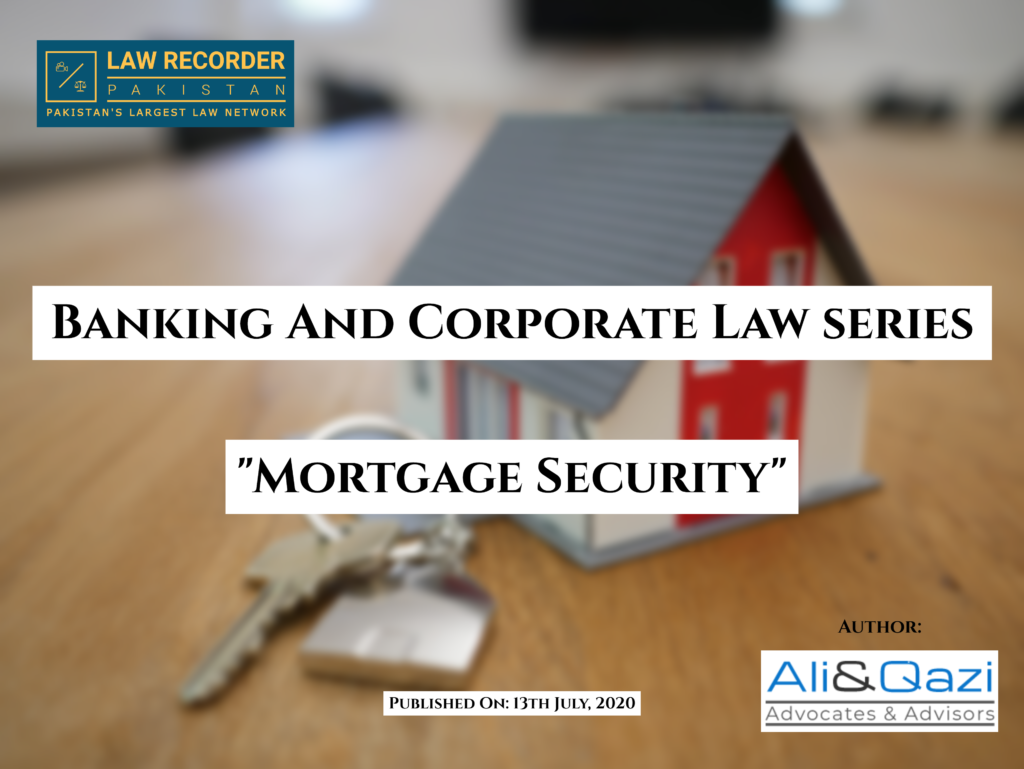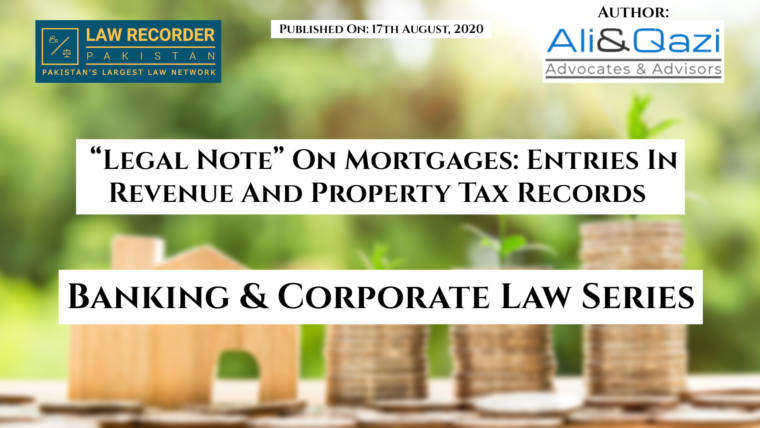Mortgage Security
This article covers all the aspects of Mortgage security and procedures involved while creating a valid mortgage.
1. The nature of a mortgage:
In a mortgage, the mortgaged property is transferred by the mortgagor to the mortgagee, by way of security and mortgagee acquires “title” to the property by way of security. If the security obligation is discharged then the mortgagee is required to retransfer the property back to the mortgagor. In the case of a mortgaged property, any new transferee of the property from the mortgagor can not defeat the right of the mortgagee even if the transferee is not aware of the mortgage.
2. The nature of a charge:
A charge does not involve transfer of the property itself by the chargor to the chargee. The transaction does not result in the chargee becoming a holder of “title” rights in the property itself. A charge is only a “personal” promise of the chargor that the chargee would have the benefit of the property for the satisfaction of the secured obligation. In the case of a charge if a transfer from the chargor takes the property without notice of the charge he is able to defeat the right of the chargee.
3. Fundamental differences between a mortgage and a charge:
The fundamental difference has been explained above. Mortgage is a “transfer” of property while charge is only a “personal promise” with reference to a property.
4. Various kinds of mortgages:
a) Simple mortgage.
b) Mortgage by conditional sale.
c) Usufructuary mortgage.
d) English mortgage.
e) Mortgage by deposit of title deeds.
f) Anomalous mortgage.
5. Mortgages by registered documents:
All mortgages have to be by a document executed by the mortgagor, attested by two witnesses, and registered with the Sub-Registrar except a mortgage by deposit of title deeds.
6. Mortgage by deposit of title deeds:
A mortgage by deposit of title deeds can be created only when the title deed itself (and not some other document which is not the title deed, such as fard, Aks Shajra, Intiqal, agreements to sell, allotment letters, copies etc.) is taken into possession by the mortgagee. The document may be deposited with the mortgagee or someone else agreeing to hold it on account of the mortgagee.
7. Attachment of security and perfection of security:
By attachment of security, is meant that a security has been created which attaches to the relevant property and binds the mortgagor and the mortgagee. Perfection of security means that third parties are also bound by the security. In the case of companies recordation of the security within 21 days of its creation is necessary for perfection.
8. Mortgages by individuals, partnerships and companies:
There is ordinarily no bar on the powers of an individual to create a mortgage. A partner can create mortgage only if specifically authorised, and the mortgage is in connection with the business of the firm. The companies can create a mortgage only when there is a power to charge the assets of the company. The exercise of these powers has to be by the Board of Directors, or the general members, depending on the constitution of the company.
9. Mortgages for personal obligations and mortgages for third party obligations with particular reference to companies and partnership:
A company cannot create mortgage for third party obligations unless such power is clearly available in the memorandum of association and, furthermore, the power is used for the benefit of the company itself. A company is supposed to employ its property for its own profitable use, and is not supposed to burden it for risks and losses of others. The same is the position regarding the firms.
10. Mortgages created personally and mortgages created by attorneys:
A holder of power of attorney, unless there is clear authority to do so, cannot mortgage the property of the principal for facilities obtained by himself, or third parties.
11: Mortgage for a particular debts and mortgage for obligations generally:
A mortgage for a particular obligation stand discharged when that obligation is satisfied. On the other hand, a mortgage as security for obligation generally is available as a continuing security for obligations that may be incurred from time to time.
12: Negligence in obtaining a mortgage:
If due to the negligence of a previous mortgagee another person creates a new mortgage without the knowledge of the first mortgage then the second person attains priority over the earlier mortgage.
13. Normal rules regarding priority of mortgages:
The normal rule is that the earlier mortgage prevails over the subsequent mortgage.
14. Subordination of mortgages by agreement:
Parties may by contract agree that mortgage of one party shall be subordinate to the mortgage of the other party. Such agreement need not be reported to RJSC.
15. Pari passu charges by agreement:
A senior mortgagee may agree with the junior mortgagee, that it shall share its security on a pari passu basis with the junior mortgagee. Such agreement need not be reported to RJSC.
16.The effect of a pari passu charge on the first charge holder:
The security of the first mortgage holder in case of a pari passu share agreement stands diluted to the extent of the pari passu sharing. The pari passu entrant bites into the “mortgage cake” of the senior charge holder.
17. The effect of a pari passu charge on intervening charge holders:
The agreement of a senior charge holder for pari passu sharing of the security with another ranking charge holder does not affect the rights of the intervening charge holders. In order to obtain priority over them, their NOC is always required.
18. Enhancement of the amount secured by way of mortgage and its effect on intervening charge holders:
Enhancement of the amount secured by way of mortgage, to the extent of the enhanced amount, ranks inferior to the charge of any intervening charge holders, unless an NOC has been obtained from such charge holders.
19. Charge on future assets:
A mortgage may be created on assets in existence or those yet to be acquired.
20. Financing for acquisition of future assets when there is a prior charge on future assets and the holder of that charge does not give an NOC:
If a specific property is generated by the funds provided by a financier on the condition that the property so generated shall be the security of the financier alone then such property would be exclusive security of the financier despite an existing charge on future assets. However, it is necessary that the financier should obtain an agreement to that effect prior to the acquisition of the fresh property and the charge so created in case of a company is recorded with the RJSC within 21 days of its creation.
We hope that this discussion proves helpful in understanding the matter generally. However, if any action is to be taken, relating to this Article, please consult your professional advisors.





